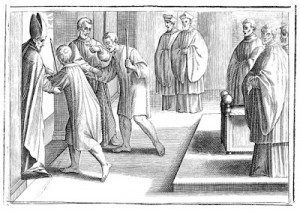
“A crime, in ecclesiastical law, is an external and morally imputable transgression of a law to which is attached a canonical sanction, at least in general. It is the law, either eternal or positive, that governs order, the relation of man to God and of man to man, and any defection from that order constitutes a frustration of the designs of Providence. But the transgression which the ecclesiastical law considers is not merely the guilty mind (mens rea), but the act, an outward manifestation of a vicious intention, or a breach of the law as externally apprehensible. . . A transgression of the law is an act, and the transgressor, therefore, is an agent, and when that agent is intelligent and free, and acts as such, we say that the effects caused by such an agent are to be imputed or credited to him.” (Rev. Charles Augustine, O.S.B., Commentary on the New Code of Canon Law, Vol. VIII, Bk. V)